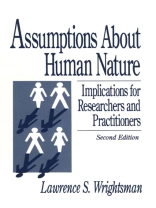This book, which is in its second edition, provides a provocative mirror from which to discern more clearly one′s own assumptions about human nature. . . . I found myself reflecting on the subject matter and its impact on my own life, including relationships, teaching, research, and therapy. . . . The author has done a superb job of raising our consciousness about human nature in this book, an I strongly recommend it to academic and applied psychologists. If you need an invitation to examine your views about human nature, this book is it. –C. R. Snyder, University of Kansas, Lawrence In general, are people trustworthy or unreliable, altruistic or selfish? Are they simple and easy to understand or complex and beyond comprehension? Our assumptions about human nature color everything from the way we bargain with a used-car dealer to our expectations about further conflict in the Middle East. Because our assumptions about human nature underlie our reactions to specific events, Wrightsman designed this second edition to enhance our understanding of human nature–the relationship of attitudes to behavior, the unidimensionality of attitudes, and the influence of social movements on beliefs. Psychologists, social workers, researchers, and students will find Assumptions About Human Nature an illuminating exploration into the philosophies of human nature.
สารบัญ
The Pervasiveness of Assumptions about Human Nature
The Historical Background of Assumptions about Human Nature
Conceptualizing Philosophies of Human Nature
Measurement of Philosophies of Human Nature
Group Differences
Relationship of Philosophies of Human Nature to Attitude, Personality, and Aptitude Variables
Relationship of Philosophies of Human Nature to Behavior
Determinants of Philosophies of Human Nature
The Zeitgeist and Philosophies of Human Nature, or Where Did All the Idealistic, Imperturbable Freshmen Go?
Philosophies of Human Nature – How Much Change is Possible?
A Time for Taking Stock












